Surviving on a GoFundMe Campaign: How a Hospital Stay Without Paid Leave Forced One Family Into a Crisis No One Should Face
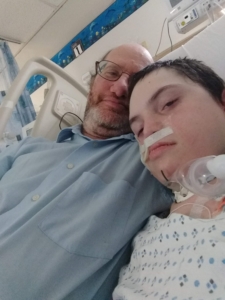
For Kerri, Ken, and their family, Father’s Day weekend 2019 started out as planned—peaceful and filled with quality family time. But early Saturday morning, Kerri and Ken awoke to their 17-year-old son, Yosh, screaming in pain. His stomach had swollen so badly overnight that it looked like a beach ball.
They were terrified for their son. Yosh, who has Down syndrome and autism, is not able to express himself well with verbal language and struggles to understand what is going on around him. However, even without words to explain what he was experiencing, it was clear his pain was severe.
Over the next several days, Yosh was placed in an induced coma as the hospital staff performed tests—and unfortunately found blockages throughout his intestines. For Kerri and Ken, the news was devastating. Yosh had never had any stomach issues. They grappled with trying to understand what was happening—all the while, never leaving Yosh’s side. They barely left the hospital as Yosh received treatment, taking turns watching him while the other rested.
They ended up at their local hospital, where Yosh is considered a VIP because of his frequent visitor status and is well-known to the hospital staff. But even as familiar with Yosh as the hospital staff are, Kerri and Ken know him best. To diagnose Yosh, Kerri says “you have to look for flying hippos with pink and purple spots” and she and Ken knew they needed to be there to help.
However, as the days turned to weeks, Kerri and Ken had to deal with something no parent should have to imagine: choosing between being with your seriously ill child and working.
Kerri and Ken are self-employed. While New Jersey has paid leave, it only covers workers who receive W2s, so both Kerri and Ken were left without help.
Kerri and Ken lived with a fear no parent should have to experience: that not only could each day be their son’s last, but that they would also lose their home in the process.
While they knew that Yosh’s Medicaid would pay for his hospital bills, without income coming in, they were terrified they would have no place to return to when the hospital stay ended. It was the scariest time of their lives. Both still experience post-traumatic stress from the situation, and Kerri shakes every time she passes the hospital.
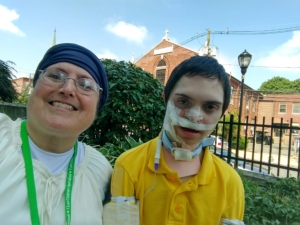
While they were in the hospital, a GoFundMe campaign was set up for Yosh and his parents. Family, friends, friends of friends, and strangers donated to Kerri, Ken, and their family that summer.
And, through their help, they were able to pay for their mortgage, utilities, and other essentials.
Kerri and Ken are so grateful for the generosity of others—but also angry that when they were at their lowest point, there were no resources for their family. In addition to advocating for their son, Kerri advocates for and with other families in her work.
“There are so many families that are out there that don’t even know there are resources for them… When a family is in crisis, there needs to be some place for them to go and call in someone who has the knowledge and resources to help them.”
Kerri and Ken don’t want anyone else to ever go through what they did. Paid leave shouldn’t depend on the kind of tax form you get from your job. And no one should have to choose between being there for loved ones and their homes and livelihood.
Learn more and act now to help families like Kerri and Ken’s nationwide.
Visit thearc.org/covid19recovery to learn more.

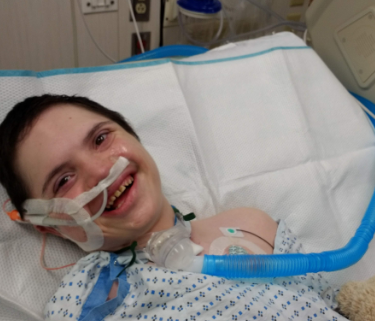

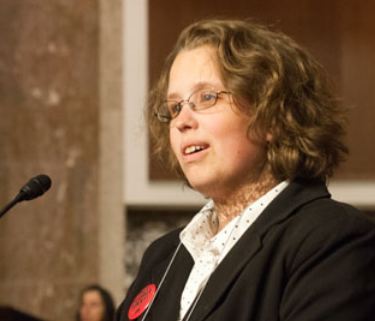
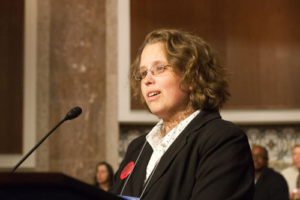 I live in Silver Spring, Maryland. I am on the autism spectrum and have anxiety, ADD, seizures, and a learning disability. I am writing to talk about the importance of helping people with disabilities get their student loans discharged, including ending the 3 year monitoring period. As the Biden Administration works to address student loan debt for people with disabilities, it is critically important that the application process be easier and we eliminate the 3 year monitoring period for work earnings. Student loans create a major financial hardship on people like me and many others with disabilities, especially those who live on their own in expensive areas. The amount of loans that I had discharged was around $1,177 which is just slightly less than what I pay in monthly rent for my studio apartment. No one with a disability should have to choose between paying for rent or basic needs and student loans. Many of us in the disability community struggle with finding jobs that pay livable wages where we make enough to live comfortably off public benefits. Benefit cliffs often force us to make big trade-offs between working and needing to stay eligible for public benefits. Some people with disabilities have their Social Security benefits cut to pay their student loans and that isn’t fair.
I live in Silver Spring, Maryland. I am on the autism spectrum and have anxiety, ADD, seizures, and a learning disability. I am writing to talk about the importance of helping people with disabilities get their student loans discharged, including ending the 3 year monitoring period. As the Biden Administration works to address student loan debt for people with disabilities, it is critically important that the application process be easier and we eliminate the 3 year monitoring period for work earnings. Student loans create a major financial hardship on people like me and many others with disabilities, especially those who live on their own in expensive areas. The amount of loans that I had discharged was around $1,177 which is just slightly less than what I pay in monthly rent for my studio apartment. No one with a disability should have to choose between paying for rent or basic needs and student loans. Many of us in the disability community struggle with finding jobs that pay livable wages where we make enough to live comfortably off public benefits. Benefit cliffs often force us to make big trade-offs between working and needing to stay eligible for public benefits. Some people with disabilities have their Social Security benefits cut to pay their student loans and that isn’t fair.









